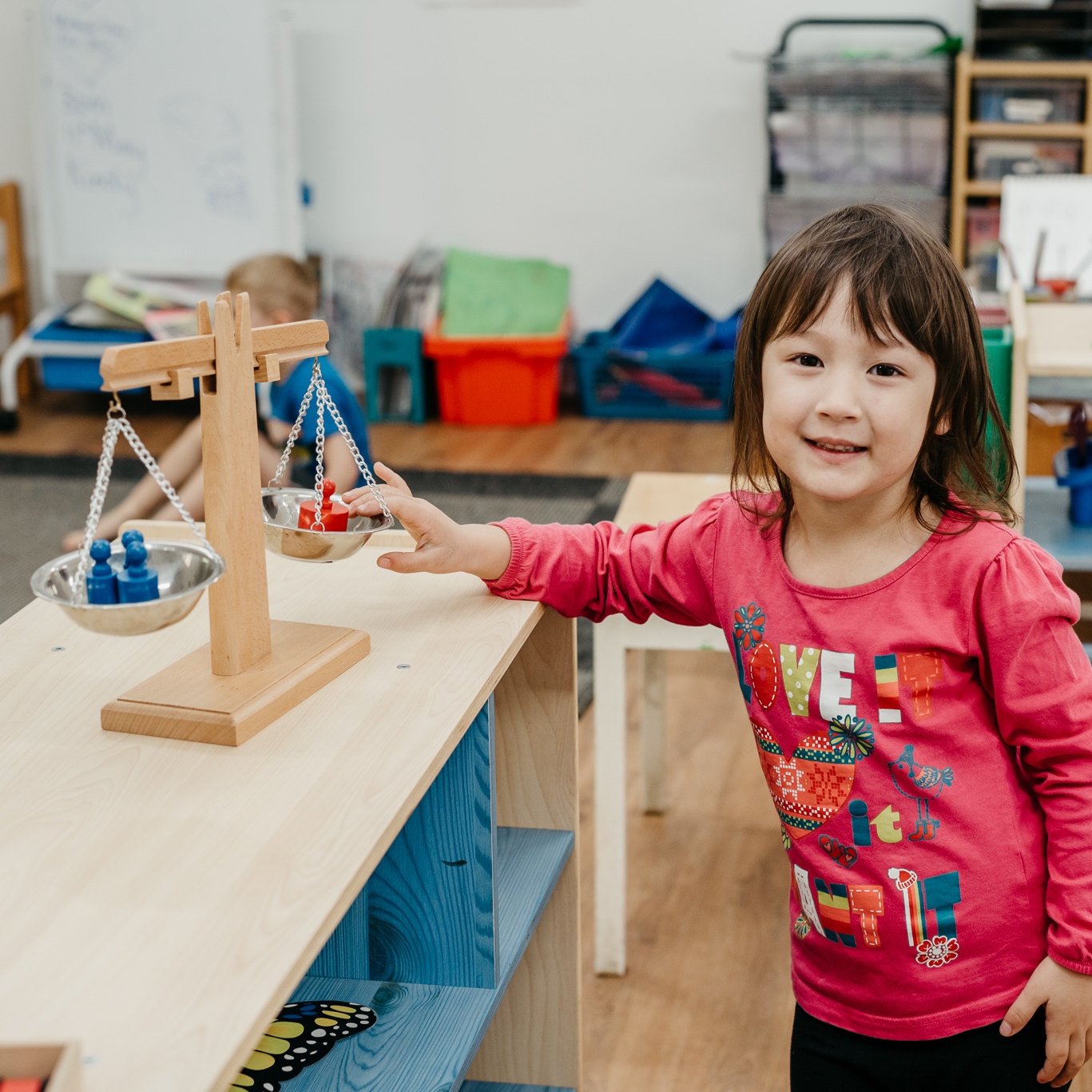Why Montessori?
The Montessori method is about helping our children develop a love for learning and skills for life. We want them to learn how to learn, not just how to remember facts and figures.
A Love FOR Learning
Our children have more access to information than any other generation before them. All they need to be successful is to learn how to learn. We don't focus on rote learning, instead, we focus on cognitive and social development. We help guide children in discovering their own love for learning through exploring curiosities and interests.
SOCIAL SKILLS FOR LIFE
Building skills in teamwork, leadership, self-confidence and relationship development is huge part of what we do. Children benefit from multi-age interactions helping them learn more and develop new skills. Team-work and collaboration is encouraged to help children learn from each other. Learning, respect and relationships build the child's confidence.
BUILD HEALTHY HABITS
Children are encouraged to explore things that interest them and focus their time accordingly. These time management skills form healthy habits that stay with the child and prepare them for formal schooling as well as benefiting them throughout the rest of their life.
Montessori Learning Outcomes
Children develop holistically with an equal focus on academics and overall wellbeing
Children develop independence, concentration, and real-life skills
Children express a range of emotions, reflect on their actions, and demonstrate awareness of others perspectives
Children develop investigative skills, ask questions, and apply a range of thinking strategies to problem-solve
Children use their senses to explore, investigate, and create
Children participate in physical activities and follow the rules of the games
Children show self-confidence and interact well with others
Children respond to challenges and demonstrates problem-solving skills
Children demonstrate care for the environment and an interest in sustainability
Montessori’s Ten Commandments
Source: Preface to Around the Child, AMI, Calcutta India, Vol. 7, 1967
Never touch the child unless invited by him
Never speak ill of the child in his presence or absence.
Concentrate on strengthening and helping the development of what is good in the child so that its presence leaves less and less space for bad.
Be active in preparing the environment: take meticulous and constant care of it and help the child establish constructive relations with it. Show the proper place where developmental materials are to be kept and demonstrate their use.
Be ever ready to answer the call of the child who needs you and ever listen and respond to the child who appeals to you.
Respect the child who makes a mistake and can then or later correct himself. Stop firmly and immediately any misuse of the environment and any actions which endangers the child, his development, or that of others.
Respect the child who takes rest or watches others working or ponders over what he himself has done or will do. Neither call him nor force him to other forms of activity.
Help those who are in search of activity and cannot find it.
Be untiring in repeating presentations to the child who refused them earlier; in helping the child acquire what is not yet his own and overcome imperfections. Do this by animating the environment with care and purposefulness, with silence, with mild words and a loving presence. Make your ready presence felt to the child who searches and hide from the child who has found.
Ever treat the child with the best of good manners and offer him the best you have yourself, and at your disposal.
Questions to ask when looking for a Montessori Education Centre:
What training and qualification do the Educators/Teachers have? Are you affiliated with a Montessori Organisation?
All educators in the Early Leaning sector in Australia must have an approved Diploma, Cert III or Bachelor’s degree in Early Childhood Education and Care. The Montessori Diploma or Cert III is on top of these qualifications. There is a Montessori Diploma and Certificate III, along with many short courses for ongoing professional development.
How are the learning age groups decided at your Centre?
Multi-age classes are a fundamental aspect of a Montessori environment. Teaching and learning from one another across multi-ages (3 years ideally) is how Maria constructed her philosophy. Our classes and groups embrace this philosophy whilst remaining sensitive to the individual care needs of each child, to deliver our children the best care.
What does “freedom within limitations” look like at your Centre?
Our Centre is intelligently designed to keep our children safe whilst giving them the freedom and confidence to self-direct. Children are free to move around the various indoor and outdoor environments, choose materials and work independently. They do not need to ask permission to eat, rest or use the bathroom and are free and encouraged to learn from and collaborate with one another.
How is the real-world learning modelled at the service?
We build real-world learning into every day. From caring for the environment and building self-confidence and autonomy to growing fruit and vegetables and researching topics relevant to them. Our children develop to be confident, self-directed learners ready to take on the world.
Is there a 3-hour work cycle?
Yes, this is fundamental aspect of a Montessori environment. The 3-hour uninterrupted work cycle in the Montessori classrooms builds deep concentration. This concentration is something that we want to strongly foster in our children given that our world today is full of distractions. Being able to concentrate deeply becomes an invaluable life-long skill.





